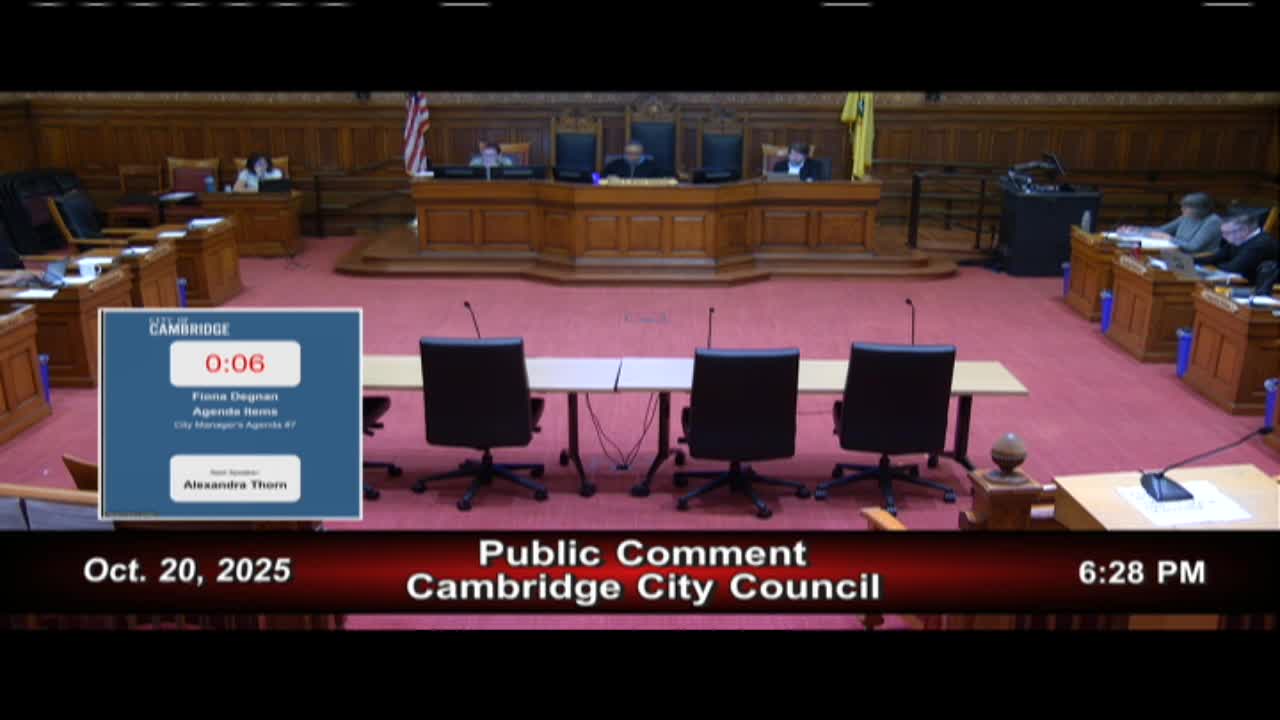Cambridge council approves FY2026 tax rate after hours of public comment over commercial spike

Summary
After a lengthened public comment period with business owners and residents warning of harm to small firms, the Cambridge City Council approved the city—s FY2026 tax rate, including a 22% rise in the commercial rate and a 30% owner-occupied residential exemption.
The Cambridge City Council voted unanimously Monday to set the city—s property tax rate for fiscal 2026, approving the tax-rate classification, a minimum residential factor and a 30% residential exemption after extended public comment from small-business groups, residents and city finance staff.
Business leaders and residents told the council the proposed 22% increase in the commercial rate would hit small storefronts and restaurants during a period of weak office and lab values. The council recessed its regular meeting at 6:30 p.m. to hold the required tax-rate hearing and returned to finish public comment before voting later in the evening.
The tax-rate decision matters because the City Council sets the split between several property classes after the city assessor calculates property values. Assistant City Manager Claire Spinner and Director of Assessing Gail Willett explained that the city—s operating budget growth (3.8% for FY2026) in combination with shifting assessed values produced a larger increase in the commercial rate than in prior years.
In public comment, Karen Kelly, associate director of Cambridge Local First, said the 22% jump "more than doubles last year—s already drastic increase" and asked the council to delay adoption until a full economic-impact assessment could be completed and to examine a small-commercial exemption for parcels under $1 million in value. Denise Jillson of the Harvard Square Business Association and other representatives urged sustained engagement between city staff and business associations going into next year—s budget process.
Councilors acknowledged the difficulty. Several members said the increase was driven by prior budget decisions and by assessment changes in commercial parcels; department leaders told the council that some commercial properties with deep valuation declines would not see higher bills in dollars even though the rate rose. Finance staff warned that few legally available options exist to target tax relief solely at small commercial tenants: the split between classes and legal limitations under state law constrain local variation.
After the discussion the council voted on a series of motions required by state law. A motion to approve the tax rate for FY2026 (moved by Councilor Wilson) passed by roll call: Councilor Razin (yes), Vice Mayor McGovern (yes), Councilor Nolan (yes), Councilor Siddiqui (yes), Councilor Sabrina Wheeler (yes), Councilor Toner (yes), Councilor Wilson (yes), Councilor Zuzi (yes) and Mayor Simmons (yes). The council also adopted the required classification of property into five classes and a minimum residential factor of 0.600298 (motion by Councilor Nolan), and it approved a 30% residential exemption for owner-occupied homes (motion by Councilor Toner). Each of those votes was recorded in the affirmative by nine members.
Councilors and staff said the real work will be in the coming budget season: councilors urged outreach and clearer public information about how budget choices translate into tax impacts. Staff said they will return with clearer analyses of how valuation shifts within the commercial class affected dollar bills and with options for next year—s budget process; they also said statutory limits (including provisions flowing from Proposition 2—2) limit the council—s flexibility.
The council recorded formal approval of the tax-rate classification and associated items required for submission to the Massachusetts Department of Revenue. Staff said they will continue to meet with business groups and neighborhood stakeholders as the FY2027 budget is developed.
Ending: The council—s votes set the FY2026 rates and the residential exemption; city staff and councilors signaled more engagement ahead of next year—s budget cycle to explore mitigation measures and better public outreach.

